If you’re experiencing betrayal trauma in a relationship, here’s a list of 50 things you need to know. To discover if you’re emotionally abused, take this free emotional abuse quiz.
This A-Z Betrayal Trauma Glossary is intended to help women learn everything they need to know about betrayal trauma in a relationship: what caused it and what to do next. If you need live support, attend a Betrayal Trauma Recovery Group Session.

Abuse
A way of thinking that deems exploitation of another person acceptable. The aim of abuse is control and exploitation. Abuse is not just physical assault. Abusers use tactics that impact emotional, psychological, spiritual, sexual, and financial well-being. The results are devastating and severe to his wife, as well as any children in the home.
Emotional and psychological abuse are devastating with severe consequences to women and children. Women in non-physical abusive relationships are often so manipulated, they don’t even know their husband is emotionally or psychologically abusive. Abusive people don’t lose control. They try to assert control through lies, manipulation, anger, sexual coercion, marital rape, physical intimidation or violence.
Pornography use is emotional and sexual abuse, even if the pornography user identifies himself as an “addict”.
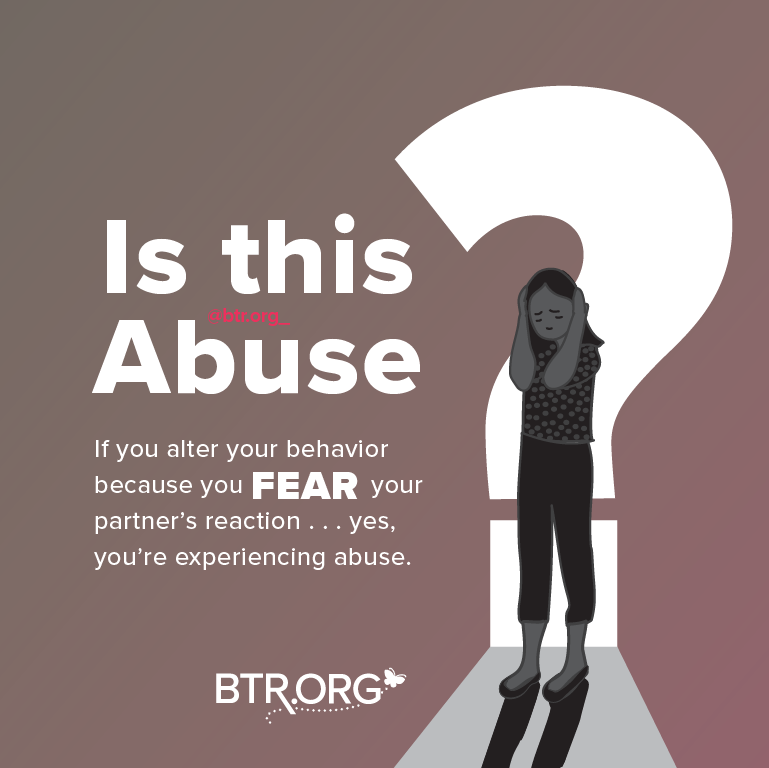
Abuse-by-Proxy (See “Parental Alienation”)
When abusive men continue to terrorize and attempt to control victims using the family court system, by harming the children, and utilizing other unsafe people, this is abuse-by-proxy. It’s good for victims to notify authorities about emotional, psychological, physical, or sexual abuse. To discover if you’re emotionally abused, take this free emotional abuse quiz.
Depending on the state and local system, the way you report may be more effective if you report through the Domestic Violence Shelter in your area or if a doctor or teacher reports in.
In some states, reporting may increase the danger for you, because they don’t take reports of emotional or psychological (or even physical or sexual abuse) seriously. We recommend taking The Betrayal Trauma Recovery Living Free Workshop will help you understand the safe strategies to use when beginning your journey to emotional safety.
Abusers may manipulate others into extending their abuse (abuse-by-proxy) by:
- Claiming “parental alienation”
- Sabotaging shared children’s relationships with therapists, teachers, doctors, etc.
- Refusing to co-parent in a healthy, constructive way
- Inserting themselves into the victim’s personal life
- Continuously bringing the victim to court
- Threatening or actually involving CPS or law enforcement simply to terrorize the victim
- Attempting to convince (gaslight) the children that the victimized parent is unhealthy, abusive, and/or in any way a less desirable parent than the abuser
- Neglecting the basic emotional and physical needs of the children
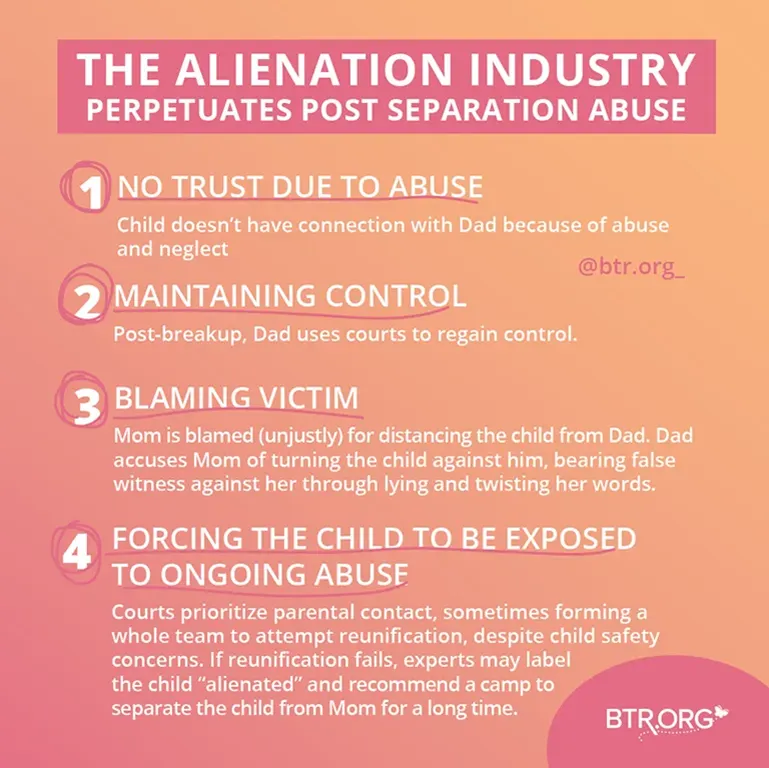
Abusive Patterns
Abusers skillfully keep their victims in (a cycle) patterns of emotional, social, and psychological entrapments. That make escape seem impossible and the abuse difficult to detect. These patterns can include the following phases:
- Manipulation (psychological and emotional abuse) – attentive, kind, helpful, apologetic, promises to seek help, admits there is a problem in the relationship
- Tension (psychological and emotional abuse) – any behavior from the victim that the abuser sees as offensive. Including the partner asking the abuser to seek treatment for the abuse he admitted to when he used manipulative kindness. This creates resentment, which builds up
- Overt abuse – physical (punching walls, screaming in your face), sexual (pornography use, soliciting prostitutes, sexting), verbal (name calling, avoiding questions), emotional (manipulating emotions), psychological (gaslighting, lying), financial, spiritual
- Denial (psychological abuse)– gaslighting; minimizing; victim-blaming; bold-faced lying; turning friends and family against the victim
Not all abusive episodes go through these phases. For example, lies to deceive are ongoing, and a form of coercive control over a wife.
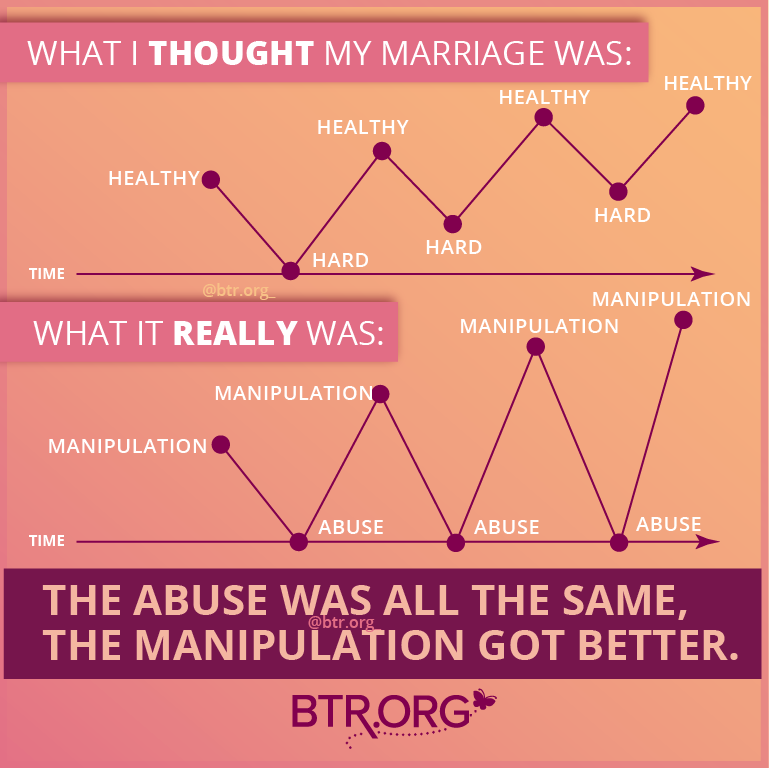
Accountable
Recognizing and accepting full responsibility for thoughts, feelings, perceptions, choices, etc., and the outcomes of those actions and choices.
Accountability
Taking responsibility for actions by acknowledging the abuse, working diligently to change behavior, and doing the incredibly hard work to make amends by continuous actions. An abuser’s wife and/or children are never responsible for any aspect of the abuser’s decisions or behaviors. She cannot cause, cure, or control it.
Long-term accountability (current research indicates 3-5 years) can be a sign of change for the abuser. However, short-term bursts of accountability are manipulation used to trap the victim.
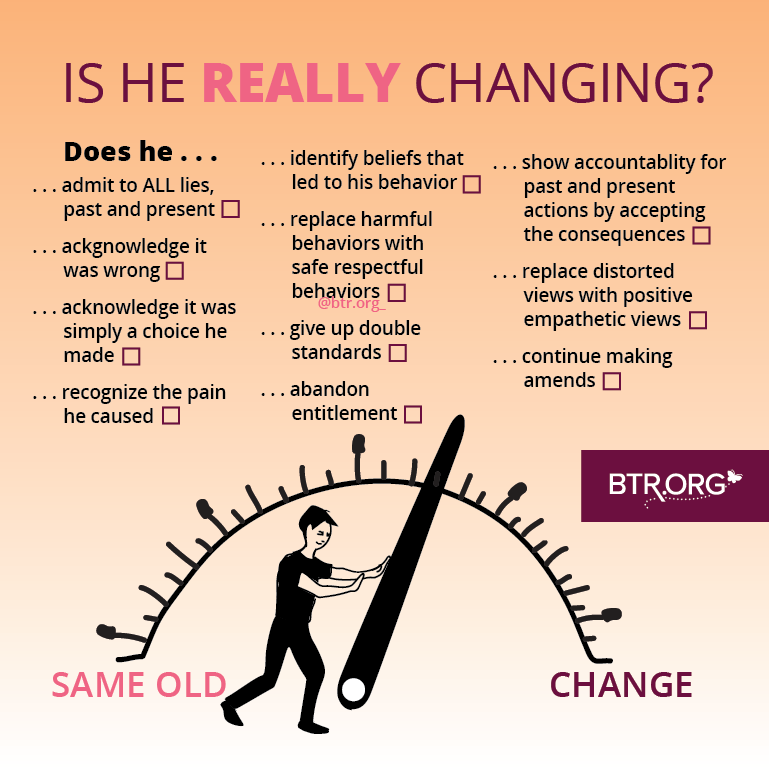
Acting Out
Abusers who identify themselves as “sex addicts” “act out” when they commit infidelity against their wife whether with another living person, themselves (through masturbation), virtually, or through fantasy. At Betrayal Trauma Recovery , we see any acting out as abuse.
Addict Brain Or Addict Fog
In the CSAT community, Addict Brain/Fog refers to a period of emotional withdrawal or overt emotional or psychological abuse by the abuser, directed toward his partner and/or children. At Betrayal Trauma Recovery, we view withholding truth, affection, attention, and focus from his wife and/or children to use pornography or have an affair. As extremely destructive emotional and psychological abuse.
Attachment Therapy
This form of therapy causes secondary trauma to victims of abuse, because it blames the victim. The theory contends his abuse is due to attachment issues, so a healthy attachment could cure him. Marriage counseling and/or therapy are detrimental when abuse is present, because abuse renders someone too dangerous for attachment. A victim who attempts to attach to an abuser will only end up being harmed.
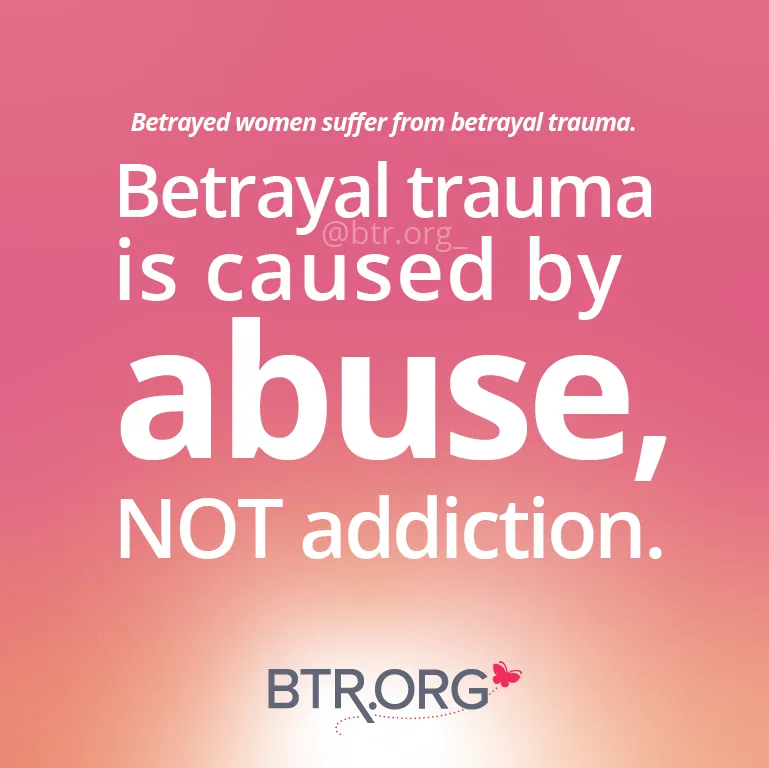
Betrayal Trauma
Betrayal Trauma is the devastating result of a woman being abused by her husband’s infidelity. Including pornography use and the related lies, manipulation, gaslighting, emotional and psychological abuse, and sexual coercion. Sufferers of Betrayal Trauma experience emotional, psychological, physical, and spiritual symptoms that disrupt daily life. Healing from Betrayal Trauma is possible only if she separates herself from abuse, and is surrounded by a strong, nurturing support system.
Blame-shifting
Transferring fault to another person to avoid accountability. Blaming another person for the abuse or compulsive sexual behaviors. For example, saying, “If you wouldn’t do ____, then I wouldn’t look at pornography/hire prostitutes/yell at you.”
Boundaries
Boundaries are the pathway to safety and the most powerful form of self-care. It is the most proactive action a victim can take. Boundaries are essential to healing; they enable women to safely care for themselves, because they are safely removed from abuse. Boundaries are not words. They are actions to keep a woman safe. They do not need to be stated to take action.
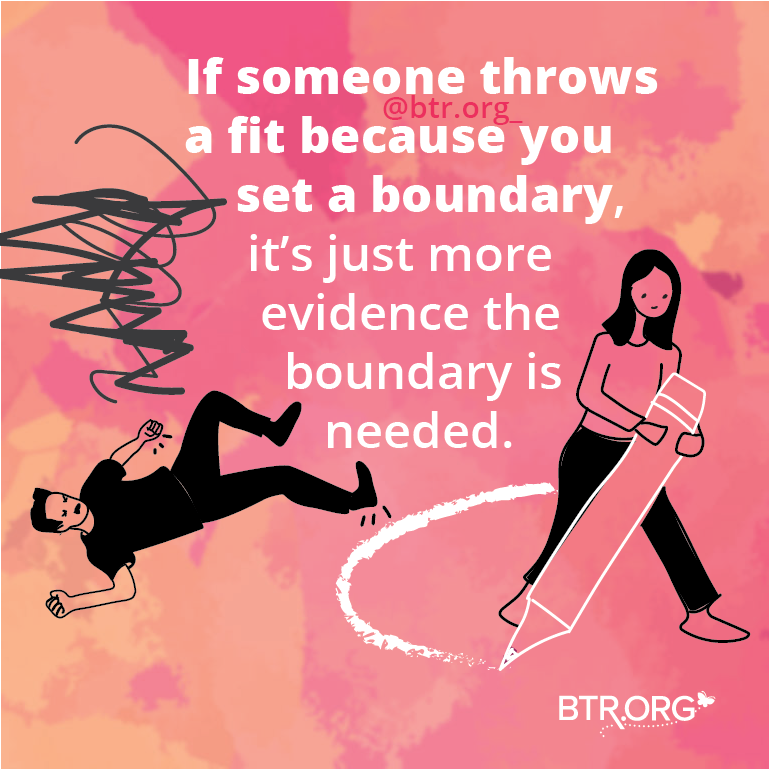
CSAT
A Certified Sex Addiction Therapist. While CSATs seemed to be the only group available to help victims of sexual coercion. In terms of their husband’s pornography use or infidelity. CSATs are not trained adequately to clearly see the abuse patterns deployed by abusers. We do not recommend that emotional & psychological abuse victims go to a CSAT or get their husband to go. Instead, attend a Betrayal Trauma Recovery Group Session.
Check-in
A practice recommended by CSATS, other pornography addiction professionals, and clergy. At Betrayal Trauma Recovery we don’t recommend checking in with a psychological abuser about his abuse, whether in person, over the phone, or in writing, since it only serves as an opportunity for the abuser to manipulate his victim.
Coach
Betrayal Trauma Recovery’s coaches provide professional support and offer insight, validation, and direction for wives of pornography users and sex addicts. All of our coaches have been through it, are trained by BTR.ORG, and are certified.
Codependency
A label sometimes put on victims of abuse to encourage taking some level of responsibility for the situation. This model is false and negates the reality of abuse.
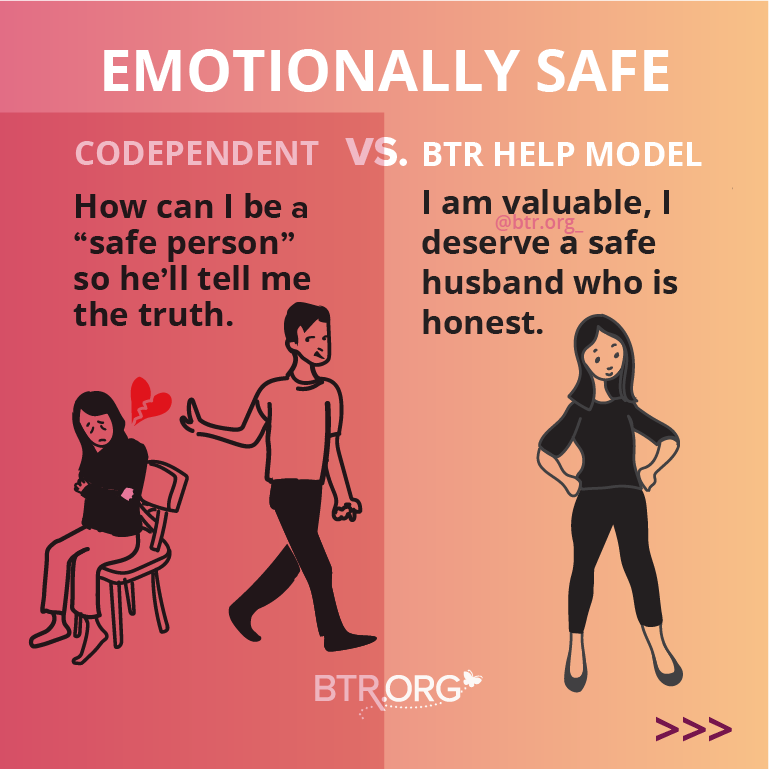
Crazy-Making
See Gaslighting.
Detachment
Detachment occurs when the wife of an abuser removes herself emotionally from the devastation of the abuser’s choices. Often, this takes place once she has separated from him, and the manufactured relational tethers have begun to disintegrate.
Discovery
When a husband’s previously undisclosed sexually perverse behavior is discovered. This is most often a traumatic, shocking, and/or sometimes dangerous event for the woman. It can be discovered without any warning, or it may be suspected and D-Day (Discovery Day) confirms it.
D-day is traumatic. The woman’s sense of reality is shattered, and often experiences distorted feelings of guilt, blame, confusion, intense fear, nightmares, despair, insomnia, etc. This is usually the point at which she discovers some abuse, and she is usually shocked to discover that she’s been a victim of abuse for years without knowing it. See Trauma for more details.
Drama Triangle
The Drama Triangle is a psychological theory often presented to couples in troubled relationships. The application of this theory blames both parties. However, in the abusive marriage, there is no Drama Triangle: there is simply an abuser and his victim.
The abuser will use all three roles in the Drama Triangle (victim, rescuer, and persecutor) to control and harm his wife. When she reacts to his abuse, he labels her and/or poorly trained “professionals” as any of those three roles (victim, rescuer, or persecutor), when in reality, she’s simply an abuse victim trying to survive. Using the Drama Triangle to describe the relational dynamics of an abusive marriage is like trying to diagnose cancer using a cheese grater. It simply makes no sense.
Emotional Abuse
Any behavior that harms the emotional well being of another.
Emotional Safety
A state in which a person can be open and vulnerable with another person. Several factors play into being emotionally safe. When a victim is being manipulated with kindness, she often feels emotionally safe, even though she isn’t.
Emotional safety happens when you feel loved, adequate, and safe to share your feelings. Your husband sees you as an equal, worthy of his love and respect.
Emotional Affair
When your husband spends his emotional energy, time and attention on someone other than you, gaslighting you to protect his behavior.
Empathy
A powerful tool to connect with others, respect an individual’s situation, and sit with them in their pain, rather than trying to fix or lecture. When we feel empathy for another, we acknowledge and/or validate their pain as we place ourselves in their situation. Empathy is the ability to recognize and respond to another’s pain, taking responsibility for your part in causing that pain (only if appropriate).
Empathy can also be a torturous tool in the arsenal of an abusive man, used to tell his wife that she is not empathetic if she does not condone his behavior. Or if she is hurt by the things he did in “the past”, even if the past wasn’t very long ago at all or he’s still doing it.
Enable
To enable is to give someone permission to continue doing something. Those who do not immediately support and believe the victim are, accidentally or intentionally, enabling the abuser.
Fantasy/Fantasizing
The practice of using stored images of sexually perverse activities in his mind involving other people, pornography, movies, or made up scenarios. Including his own wife or children, resulting in sexual pleasure or arousal with or without masturbation.
Faulty Core Beliefs
Deeply held beliefs that are not true. For example, we may have come to believe early in our life that we need to earn love, are unlovable, or somehow caused this trauma and pain ourselves. Betrayal Trauma Recovery Coaches are trained to help you rediscover your self-worth.
Fight, Flight, Freeze, or Fawn
Common ways victims respond to abuse in an effort to survive. A natural, totally normal way to respond when our physical, mental, or emotional safety is threatened—or when we perceive that our safety is threatened. Physically, we might experience rapid heart beating, rapid breathing, trembling, becoming paralyzed with fear, etc. Our body is literally reacting to a threat and goes into a type of survival mode.
Gaslighting
A tool using lies by abusers to harm their victims. They psychologically manipulate to distort reality, causing a feeling of craziness, also referred to as crazy-making.
Grief
A feeling of profound sadness and loss. After discovery, the woman experiences stages of grief due to the fact that the world she lived in is essentially gone and replace with something irrecognizable. To fully heal, a traumatized woman must allow herself to grieve. Through her grief, a victim of abuse can find ways to grow.
Gut/Intuition
Abusers seek to silence the inner voice of their victims, also called the gut, or intuition. The inner voice that warns victims when something isn’t quite right. Listen to that voice: it will tell you when you are in physical, emotional, psychological, or sexual danger. Research has shown that the intuition of women in abusive relationships is almost always correct.
Honoring Emotions
Women honor their emotions when they recognize, name, and respond to those emotions as they occur. Women in abusive relationships may have a difficult time naming or even expressing emotions due to the type of coercive control they experience.
Self-validation is key to successful emotional honoring and mitigating emotional denial. That may lead to a lack of safety. It occurs by recognizing that what we feel is real. And to be willing to learn from the emotion, rather than pushing it down to avoid the pain. We can honor other’s emotions by respecting that our life and emotional and psychological safety are our responsibility. And we need to take action to protect ourselves.
Infidelity
Behavior or circumstance when a husband is unfaithful, undisclosed sexual behaviors, including pornography use, masturbation, fantasizing, sex with others, and emotional affairs constitute infidelity and are therefore abuse.
Lust
An intense desire to satisfy physical appetite. A form of infidelity, if directed towards a person outside of an exclusive relationship, such as marriage. Sexual abuse occurs in marriage and committed relationships when the abuser treats his wife like an object to satisfy his sexual desires.
Manufactured Emotional Tether
As part of the abuse pattern cycle, the abuser comforts his wife after a period of excruciating emotional/psychological/sexual/physical abuse. And the comforting and promises, often including intense sexual “intimacy”, culminate in an emotional tether, trapping the victim. Every time the cycle reoccurs, the manufactured tether gets stronger.
While an abuser may claim he feels “close” to his partner, he is deceptively using/misrepresenting the idea of “closeness”. One cannot be “close” or “intimate” with someone they are abusing. The manufactured tether creates a false deceptive relational experience for the victim, entrapping her in the coercive tactics of the abuser. Generally, the manufactured tether cannot be broken without a period of separation.
Minimizing
Abusers who use emotional abuse, pornography, emotional affairs, sexting, etc, minimize their behaviors by:
- Lying: denying pornography use when you know he’s using.
- Justifying: “Guys do pornography all the time, what’s your problem?” Or “it was just pornography, not an actual affair.”
- Rationalizing: “It just popped up on my screen.”
- Blame-shifting: “I turned to pornography/affair because you don’t meet my sexual needs.”
Multi-Dimensional Partner Trauma Model
The framework used by so-called betrayal trauma specialists, namely therapists and coaches. At Betrayal Trauma Recovery, we have observed that this model does not address pornography, lies about pornography use, etc. as abuse.
Narcissistic Behaviors
Patterns of behavior that may include self-centeredness, an apparent, desperate need for attention, refusal to offer empathy, or grandiose ideas of self.
At Betrayal Trauma Recovery, we don’t diagnose because we are not therapists. Even if we were, abuse is not in the DSM. However, we help women recognize the patterns of behavior commonly deployed by abusive men, most exhibit narcissistic traits.
No Contact
A boundary that eliminates contact between the abuser and the victim. It can include blocking phone calls, texts and emails. To learn more about strategies for eliminating contact with abusers, enroll in the Betrayal Trauma Recovery Living Free Workshop.
Objectify
Any activity that degrades other human beings to the status of an object. This includes activities of pornography, strip club attendance, sexual behaviors with prostitution, sex with self, affairs, fantasizing, identifying people by body parts and appearance, rather than personality traits and strengths.
Parental Alienation
The Parental Alienation Movement is a widespread, abuser-friendly movement that enables abusers to control victims and children. The basis of the Parental Alienation theory is that children of abusive men should be forced to spend time with their abusive fathers, especially if they are afraid of their father or prefer their mother. Abusers claim victims “alienate” the children from them, but the reality is that children of abusers simply prefer the non-abusive parent.
When abusers claim “parental alienation” and courts generally side with the abusers. Victims and their children are re-traumatized via the secondary abuse from the courts. This is known as abuse-by-proxy.
Primary Attachment
Attachment to a person in your life who is a significant source of comfort and assistance i.e. parent, caregiver or spouse.
Protective Action
When victims display behaviors that are not consistent with their character due to the abuse, they may be taking protective action. Betrayal Trauma Recovery uses this term instead of “reactive” or “mutual” abuse. We also call this Resistance to Abuse.
Post-Separation Abuse
The spectrum of post-separation abuse is wide, but can include:
- Continued gaslighting, manipulation, lies, and coercion
- Refusal to meet the children’s physical and emotional needs during their parenting time
- Financial abuse through continuous litigation
- Defamation
- Abuse-by-proxy
- Voyeurism
- Threats
- Stalking
- Physical violence
Pornography
Any material, written or visual, used to arouse sexual feelings in a person. It is also used to satisfy sexual desires and is a tool used to degrade humans into sexual objects. Furthermore, pornographic material is often created using underage girls and women sold into sex slavery. To support the pornography industry is to support child sex slavery/sex trafficking.
At Betrayal Trauma Recovery, we firmly stand behind the truth that all human beings who view pornography are choosing to support an industry that fuels modern day child slavery. We find this despicable. Likewise, we do not parse out pornography to levels such as soft or hard. Any image, digital, print or visualized used in secret for personal satisfaction is abusive to the marriage relationship. And those forced to participate in its making.
Rationalizing
Attempting to justify or explain a behavior to make it appear logical. For example, “I didn’t do anything wrong; it just popped up on my screen.” Or “I wouldn’t yell at you if you didn’t get so crazy.” Any attempt to justify his behaviors based on circumstance or on the behaviors/feelings of the abuser’s partner and/or children is rationalizing and is abusive.
Recovery (For Victims)
Healthy, recovered women have chosen to seek safety from an abusive relationship. They know that they are not the problem.
Recovery (For Abusers)
At Betrayal Trauma Recovery, we don’t believe a man needs a program to stop being abusive. He just needs to start being honest, treat his wife as an equal, take her concerns seriously, stop trying to control outcomes, etc. Actually, he needs to change his character through consistent, healthy behaviors over time. Any one can do this if they choose.
Healthy, recovered men have not been abusive for at least 3-5 years, which includes being completely faithful to their wife if married, having dedicated their lives to living amends, and contributing in a healthy way to a peaceful society. If their wife pursued divorce, then the man in recovery from abuse happily pays child support and alimony.
He is supportive in whatever way his ex-wife has requested, and is supportive of her boundaries. When/if she decides to engage in a new marriage, he continues these supportive behaviors. Without relapsing into abusive behaviors toward his ex-wife and/or children.
Relapse
A term used in the so called “sex addiction” community to describe abuse.
Safety & Truth-Seeking Behaviors
Abusers often throw their victims under the bus by mislabeling their safety seeking and truth seeking behaviors as “policing”, “controlling”, or “wearing the pants”. Safety seeking and truth seeking behavior by a victim is a natural, normal healthy response to abuse.
Examples of safety and truth-seeking behaviors include: putting filters on devices, checking phone, tablet, and computer histories, using GPS tracking to monitor where he is going, etc. When a victim of abuse knows something is wrong, she’s going to naturally try to figure it out – this is healthy. Sometimes this truth seeking behavior actually gets in the way of seeking safety. Learn more about this in The Living Free Workshop.
Self-Care
Tools to help in the healing process. In betrayal trauma, self-care refers to more than just getting a pedicure and crying on the shoulder of a trusted friend. Self-care is a choice a woman makes to learn to love herself. A woman using self-care understands that no one can take better care of herself than she can. It is one of the most loving things she can do for herself.
Examples may include but are not limited to:
- Giving herself permission to sleep when tired
- Using paper plates
- Attending a Betrayal Trauma Recovery Group Session
- Journaling
- Physically taking care of herself
- Spending time in nature
- Practicing living in the moment (mindfulness and/or meditation)
- Expressing gratitude
Shame
Everyone feels shame from time to time, especially when they violate widely regarded social norms. Contrary to popular belief, shame does not cause addiction or abuse. All people feel shame, but not everyone chooses to be unfaithful or abuse someone. For example, some people choose to call a friend, eat ice cream, or go for a jog.
Shero
The preferred term at Betrayal Trauma Recovery for a woman who has chosen to seek safety from an abusive relationship.
Slip
Like the term “relapse,” a slip is a reference used in the so-called “sex addiction” community to describe abuse without saying the word abuse.
Sober/Sobriety
A term used in the “sex addiction” community for the period where compulsive sexual behavior has stopped. Because they don’t call it abuse, they don’t factor in healthy non-abusive behavior when they talk about sobriety from “pornography addiction”.
STBX
Soon-to-be ex-husband.
Trauma
Abuse creates deep wounds. Trauma is the resulting emotional state created by the wounds. Betrayal trauma has a multi-dimensional impact, with emotional, physical, spiritual, and financial effects. When a woman discovers the reality of her situation, her husband is abusive. She needs emotional and psychological safety before she can begin healing. Traumatized women often experience a wide range of thoughts and emotions, and respond to abuse in different ways.
It is crucial to find help and support as soon as possible. At Betrayal Trauma Recovery, our coaches personally experienced abuse and trauma in their relationships. With specialized abuse training, our team of coaches help women navigate their situation and begin to make their way to safety.
Trigger
A trigger is an experience that causes a person to recall a traumatic memory. It will throw the person experiencing it back into the emotions of the initial traumatic event, often producing additional trauma responses. After betrayal, symptoms such as confusion, sadness, grief, anger, despair, and resentment may manifest. Sometimes the trigger can be noticed, like being yelled at by someone, and sometimes it sneaks up and sabotages walking down an aisle at the grocery store.
It is important to be aware that what others may call a trigger is actually just a normal response to experiencing abuse in real time. If you are triggered, rather than assume the danger has passed, assess the situation to see if emotional and psychological abuse is currently harming you.
Vulnerability
Not something to share with an abuser. Sharing emotions and experiences with safe people is key to beginning the journey to safety. Learn more about this by enrolling in the Betrayal Trauma Recovery Living Free Workshop.
White-Knuckling
A term used in the “sex addiction” community to identify a “struggle” with behavior or emotional management that’s really just abuse. Most often used in the past-tense to describe his state of being before he re-engaged in abusive behaviors. Which we know at Betrayal Trauma Recovery is simply a manipulation stage of managing his image and role playing healthy behaviors to groom his victim.
12 Step
A term for self-improvement programs based on the twelve steps of Alcoholics Anonymous. Trauma research indicates that self-improvement programs are destructive to traumatized women. A woman must be completely safe from abuse before entering into any type of self-improvement program. Often, once she is safe from abuse, she finds that the “defects” of character are simply the left over voice of the abuser in her own head.



This is such a helpful tool! Thanks for sharing 🙂
Awsome List!!! I’d never heard Attachment Therapy before. Would have LOVED this list at discovery, or first month of Therapy at practice where we go. And understood, for my safety, Couples therapy was on hold until they could establish were were in a good place. I find it bizarre that this glossary is not posted all over Places that care for partners and addicts. What you guys are doing is phenomenal!!!
I would like to schedule a session with a betrayal trauma Coach to help me. How do I do that?
To schedule an Individual Session with one of our coaches, click here.
Awesome information. Sums up everything I’ve been dealing with. This has happened over and over in my relationship. I just need the courage to confront my husband. I’ve been avoiding my instincts for a couple of weeks now. I forgive my husband because I understand the whole process of recovery when I stopped using Alcohol & Drugs in the 80s I was in a 12 step program. My husband is addicted and it is hurting me and I don’t want to be a Victim anymore. Now in my 50s, I just want peace. We’ve only been together for 8 years and married almost 7 years. Most of our marriage has been a big lie. I DON’T TRUST my husband at all. Everytime I think he’s on track he relapses!!! Please Pray for me because I feel alone. I’m so grateful for your organization.
I’m so sorry for what you’ve been through. I’m so glad you found us!
I was married for 20 years. I was smart, educated, and a successful collegiate athlete. He came from a long line of distinguished and respected pastors in a non-denominational Christian church. I gave up my dreams, goals, and interests at the urging of family and friends who believed I should “respect” his calling to preach the word by supporting him and taking care of our children. I learned on the way back from an annual church convention that he had been hiding a deep, destructive habit for five years. He acted broken and sorry for 24 hours until we got back home. I believed him, so I agreed to let him tell our church elders and others about his struggles (on his own) and even agreed for him to delete all the evidence because it was “so hard on him to know it was on there.” He then proceeded to tell our church leadership that I was severely mentally ill and abusive. The burden of “protecting my secret” had taken its toll on him, and so he had exchanged a few “flirtatious” e-mails with a few women online in desperation of relationship. They believed him. I was ostracized and alienated from not only our present church but by everyone in every church we had served in our 20 years of marriage. They all believed him.
I now live in low-income housing and work as a secretary because “preacher’s wife” is not really a marketable skill. I have lost everyone but 3 friends who have known me for several years and knew he was lying. Oh, and I should mention that this church that did this was my home church where I grew up and my dad had served as senior minister for over 25 years. My husband was hired after he retired.
It’s been five years since the divorce, but I cannot heal. My ex married quickly with no issue from the church. He continued to shame me so as to protect his lies. His new wife is now also his partner in crime as she actively smears my reputation within our community. He lied to our children in order to destroy my relationship with them by claiming I had several affairs. He succeeded with my oldest (for 2 years) and failed with my 2 younger children. He even had the gall to get remarried in the same sanctuary where we were married with most of the same people sitting in the pews. The pain, betrayal, and slander I’ve experienced is something that still leaves me in shock. I’ve all but lost my faith.
Sometimes pain is too much and too strong. I’ve looked everywhere for something, someone, anyone, that could help me make sense of betrayal like this. No one understands what it’s like. But this site—this is the first time I’ve felt like maybe there’s people who really get it. I’m hoping this website may somehow provide an avenue of healing I’ve all but lost hope to find.
I am so glad you found us! I’m so sorry for all the pain you have gone through. You’re not alone!
Thank you for listing all this in one place! It’s so helpful!
Please help me. I’m in so much pain from my husband’s betrayal. It’s impossible for anyone to understand. You’re the only organization I’ve ever found who really gets it!
We get it! The pain of a husband’s betrayal is so intense!
Have you considered our daily Group Sessions? We’re here for you!
I’m so grateful for all this information! I’ve been suffering from betrayal trauma in my relationship for years and I didn’t even know!
I was married for 7 years. I came home one day from the grocery store and found out my husband had done the unthinkable. My world fell apart.
Through all of this pain, I found BTR, it has helped me understand what’s really going on. It’s been a big part of my healing process, helping me come to grips with everything I’ve been through and showing me how to move forward. I’m still fighting to piece my life together, but BTR has made me feel less alone. Thank you!
Amy, I’m so sorry. I recommend our daily, live online group: https://www.btr.org/group/
Betrayal trauma recovery has helped me so much! You’re amazing. Thank you so much for listing all these betrayal trauma terms all in one place! I’m finally starting to understand what’s been happening in my relationship because of the BTR Podcast!
All of our coaches are certified coaches through an organization accredited by ICF or BCC, and have addition specialized training specific to betrayal trauma and issues related to betrayal trauma.
Thank you so much for all you do. Betrayal Trauma Recovery has been invaluable in my healing process so far. Your Group Sessions helped me more than years of therapy.
I’m so glad you found it helpful!! Hugs!
After 30 years of betrayal trauma in my relationship, I’m still feeling anger, hurt and depression that is untreatable. I also became physically sick.
I was not able to hold up a job. I feel the only way to be healed is to have a good person that loves me to replace my husband who betrayed me. If this does not occur the damage cannot be repaired. We should not have to live with pain this intense.
I’m so sorry for your pain. I have not been blessed with another person coming into my life, but I am living a full and happy life now. You can too. Don’t lose hope. You can self partner and create a peaceful life. Have you considered joining our daily support group? Click here to learn more.
Please send more info on services you recommend. I can’t find anyone who really understands betrayal trauma.
Our daily, live, online support group: Betrayal Trauma Group Sessions
I am currently married to a man who betrayed me, and I’m reading everything I can to grow myself and to evaluate his growth progress from a grounded place instead of from an emotional state or from a manipulated state. Anyway, I have learned there is no progress on his side yet but he is in group therapy for sexual addiction and he is being held to the fire by Christian men, our chosen path and belief regarding wholeness. My husband acknowledges he is very broken and that he has done all of the narcissistic abuse by his own choices. We live in the same house but we are separated to a large degree. We have separate bedrooms, bathrooms, and offices. We share the kitchen and the living room. I am deeply hurting and yet still somewhat hopeful even in the reality of what he is doing – I am praying for his and my own healing.
I have read the responses of many women on this site and my heart is deeply moved by the community of our pain. It feels saying thank you for this place is not adequate for the value it is in our world but it is all I know to say…thank you so much! Love and healing and blessings and protection over each person responsible for this community and to those growing in it…and to those that brought each of us here.
I have a question about my own behavior. I am embarrassed to have to admit this but it is what it is. Regarding fight or flight, I am a fighter. My spirituality and the Peace of God are deeply important to me and I believe it is not right to intentionally bring harm to another person…yet I find myself having to ask for forgiveness for just that…in the three years of marriage to this man I have changed a lot. I find I live in a great deal of fear of the world. I dread going out even with friends and even to some degree my mom; who is my best friend. In reaction to some of my husband’s addiction, I’ve told him in so many different ways how much it’s hurt me.
I still cannot figure out if my reactions are part of trauma response or if I am abusive myself?!!? I am meditating on forgiving him in my heart…not so that he can continue but so that I don’t hold hate inside me which damages me. I guess I just need to know if I need to heal from trauma or if I need help for myself.
I am about to start attending BTR Group sessions because even if I have anger issues myself; I need this group for healing. Again, thank you so much for this community!
Your question is so common! Yes, joining group will help. The short answer is, even in the face of trauma and abuse, our healing is best facilitated when we live according to our own values:). Boundaries and healing can help you chose to behave in ways that are consistent with your values, so you can feel peace – that’s the goal right! We’re so glad you found us. You are loved here:).
I have been listening to the podcasts and I am going to listen to everything. I’ve lived with a addict for 28 years. And been suffering from betrayal trauma the whole time, even though I didn’t know it. I never saw this coming at all.
I have severe PTSD. I’m not really religious, but highly spiritual and have a very strong faith with God. It’s just been so long with three discoveries and I am having trouble with my rage. I wanted my marriage to work, but not sure if it can. My husband started therapy again recently, but he’s a great liar so I never know if he will get any better. I’m not sure he can recover at 78. Learning the truth about what he’s been doing all these years destroyed me. I don’t know who he is anymore and I was fine before I was with him. I feel empty and alone. Im glad someone referred me to this site.
What free betrayal trauma resources are available? I cannot afford therapy, I’ve lost my job and now I feel as if I will lose my mind.
We don’t offer therapy here, but we do have a free podcast for emotional abuse victims. The podcast seems to be more helpful to victims:).